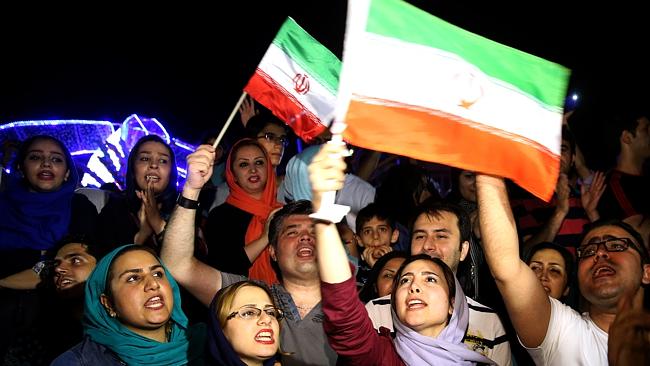IN THE MEDIA
Only Iran benefits from this appalling gamble
July 16, 2015 | Colin Rubenstein

COLIN RUBENSTEIN
HERALD SUN – JULY 15, 2015
AUSTRALIA’S Prime Minister, Tony Abbott, has cautiously welcomed the deal between Iran and six world powers regarding Iran’s nuclear program and said he hopes the deal “is an absolute stop”, rather than just a delay, to Iran acquiring nuclear weapons.
Abbott sensibly told reporters: “The last place we want to see a nuclear arms race is the Middle East and if any further country gets nuclear weapons, I suspect there will be a lot of other countries rushing for them.”
The PM’s caution and Foreign Affairs Minister Julie Bishop’s warning that Iran needs to fulfil its commitments are fully justified. The test must be whether the agreement, with the US, UK, China, France, Russia and Germany, will, in fact, stop Iran acquiring nuclear weapons – not just slow this down – and it appears to fail that test.
The agreement, known as the “Joint Comprehensive Plan of Action”, does not dismantle or roll back Iran’s illegal nuclear program, as originally planned. Instead, if Iran abides by the deal, it will retain most of its nuclear program and all its facilities, but will be prohibited from expanding or modernising its uranium enrichment infrastructure for at least a decade. After that, it is effectively open slather. Therefore, while the deal may delay Iran obtaining nuclear weapons, in effect it legitimises Iran as a military nuclear threshold state.
While the sunset clause is a huge concession to Iran, there are serious doubts that even the 10-year time frame can be maintained because of the weak inspections regime and Iran’s history of concealing its nuclear sites.
Earlier this year, US President Barack Obama promised that a deal would allow for “anytime, anywhere” inspections. However, that is not in the deal. Instead, the deal provides for “managed” inspections that require international inspectors to comply with a convoluted dispute resolution mechanism whenever they want to inspect locations outside known nuclear sites at Fordow and Natanz.
The process is likely to take a minimum of 24 days. Therefore, there can be no “surprise” visits and the dispute mechanism will provide Iran ample time to conceal any breaches before allowing in inspectors.
Obama has claimed sanctions will simply “snap back” if any breach by Iran is detected, but such claims appear fanciful. Not only do the inspection problems make it very unlikely Iran will be unambiguously caught cheating, once sanctions are lifted reinstating them would require a long process of consideration by a joint commission consisting of Iran and the six world powers before the issue can be referred back to the UN Security Council.
Furthermore, once sanctions are lifted – probably later this year – it will free about $150 billion that Iran can use to further its plans to dominate the region and export its “Islamic Revolution” – which include its funding of the Assad regime in Syria and Houthi rebels in Yemen, and supporting terrorist groups Hezbollah, Hamas and Islamic Jihad.
IRANIAN leaders continue to call for Israel’s elimination, as well as supporting terrorism against Israelis. However, it is not only Israel that is concerned by a deal that bolsters Iran’s power in the region. For many years, the Arab Sunni world, including Egypt, Saudi Arabia, Jordan and the Gulf States, has been concerned by two threats: terrorist groups including IS and al-Qaeda, and the Iranian/Shi’ite axis.
This deal will not convince Iran’s Arab Sunni neighbours that Tehran will not obtain nuclear weapons in the near future. So, as Abbott suggested, it could lead to nuclear proliferation in a volatile region that is already in the midst of violent sectarian conflict. Some analysts believe that it was the threat of the “Islamic State” that pushed world powers to seek a deal with Iran, seeing Iran as a potential ally in the fight against IS. However, Iran is no ally of the West – it is focused on its own expansionist goals.
While IS is a threat to the region and sponsors terrorism, that is also true of Iran. Moreover, in Iraq, Iranian-sponsored Shi’ite militias have reportedly committed widespread violence against Sunni communities, thus encouraging Sunni support for IS.
While some are claiming the deal will empower “moderates” in Iran, it is likely to have the opposite affect, emboldening a tyrannical ayatollah regime that has committed appalling human rights abuses that have actually become worse since the 2013 election of President Rouhani, according to the UN.
The deal will now be examined by the US Congress, but Obama has indicated he will veto any Bill to reject the deal. Given that Congress is unlikely to muster the two-thirds majority it needs to override that veto, the focus will then turn to the views of the next potential US president. Most of the Republican frontrunners have forcefully condemned the deal, while Democrat frontrunner Hillary Clinton has cautiously welcomed it.
This deal is a dangerous gamble that risks empowering a tyrannical regime that is a leading state sponsor of global terrorism, a major source of regional destabilisation and an appalling human rights abuser – as well as rewarding Iran’s blatant violation of international law in illegally racing towards a nuclear bomb in the first place.
It appears unlikely to serve the essential interests of the global community in preventing proliferation and instead will further destabilise the world’s most volatile and dangerous region.
DR COLIN RUBENSTEIN IS EXECUTIVE DIRECTOR OF THE AUSTRALIA/ISRAEL & JEWISH AFFAIRS COUNCIL AND FORMERLY TAUGHT MIDDLE EAST POLITICS AT MONASH UNIVERSITY
Tags: Australasia





